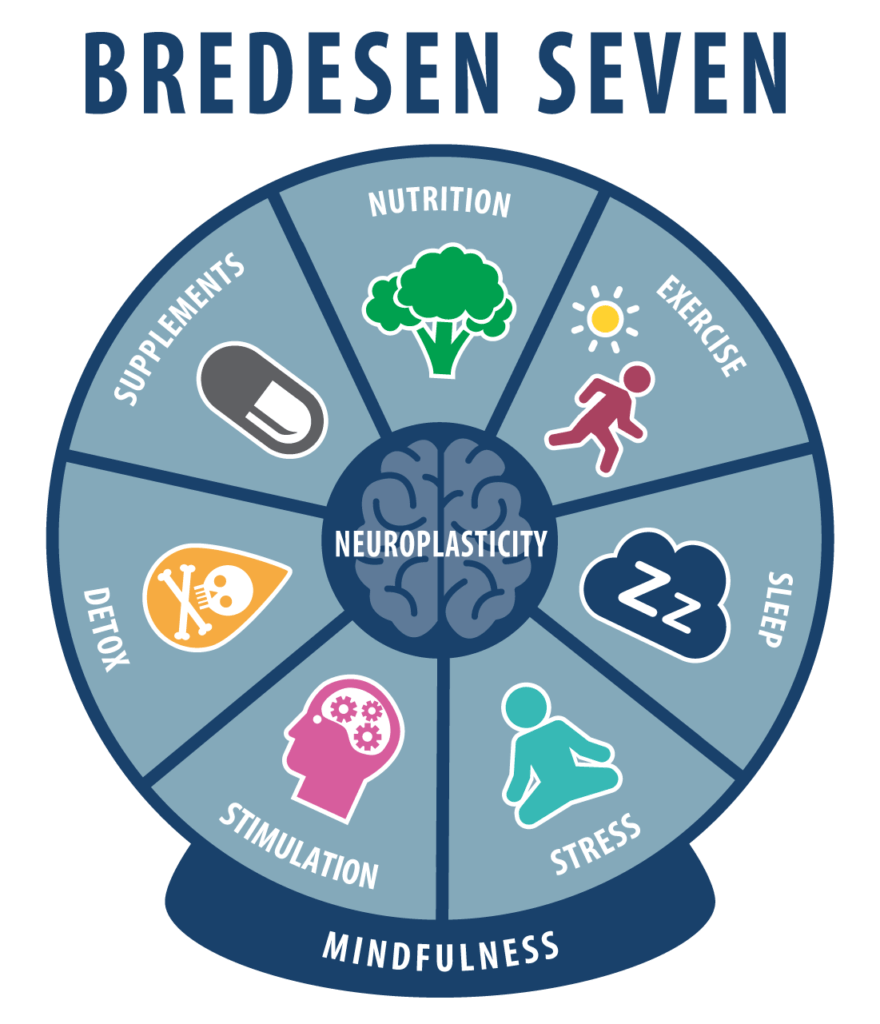June 18, 2020
Simplifying the Bredesen Protocol
By Julie Gregory, Chief Health Liaison for Apollo Health.

Hi friends-
“Summer’s here, and the living is easy.” But is it really? Especially for those who’ve recently begun practicing the protocol, it can sometimes feel pretty overwhelming. Your old way of eating and living often change pretty dramatically, depending upon your starting place. Even those that have been using the protocol for a while still may be struggling to put all of the moving pieces together. I get it. Patching thirty-six holes in the roof at the same time, especially while it’s raining, is a daunting challenge. I want to demystify the “how-to” of the protocol so that it can become an intuitive blueprint for your life. The great news is that you needn’t be perfect, and over time, most people report feeling so much better that this way of life becomes self-perpetuating. Indeed, as your mood, energy, health, and cognition all improve, for many, that becomes your motivation.
Before I dive into the details, let me take a step backward and provide an overview of Dr. Bredesen’s approach. As a neuroscientist, he’s found that Alzheimer’s results from an imbalance in the brain’s neuroplasticity signaling. As we age and are exposed to multiple toxic assaults, over time, the damaging forces (synaptoclastic) overtake the repair forces (synaptoblastic), and our brains begin to downsize and function poorly. His goal is to change your biochemistry to provide optimal conditions for your brain to thrive. He accomplishes this by identifying and addressing all of the contributors (or potential contributors) to cognitive decline while concurrently optimizing your overall health to support your cognitive health. So, while nutrition and lifestyle may be secondary to identifying and addressing the main drivers of cognitive decline, they are foundational to treating all of them.
Introducing the “Bredesen Seven”
The Bredesen Seven (or “B7”) is simply a term to introduce the seven main strategies used in the protocol. You’ve often heard that a picture is worth a thousand words. In this case, it might be true. This very simple image breaks down what could be an extraordinarily complex protocol into seven distinct, yet complementary strategies that create neuroplasticity — the ability of the brain to heal, grow new neurons and synaptic connections, in response to stimuli. Each of the strategies alone can promote neuroplasticity, but when practiced together, they create a powerful synergy. We’ve very thoughtfully placed the wheel upon a base of mindfulness.

Mindfulness is the ability to be fully present in a non-judgmental manner. Instead of ruminating about the past or worrying about the future (which tends to occupy a lot of real estate in many of our brains), it’s a choice to be fully present in the moment. I’ve learned that when I mindfully practice the protocol, I make decisions throughout the day that enable me to practice the protocol successfully. When I’m not mindful, I tend to move into “auto-pilot,” and my subconscious takes over, and I tend to make decisions that feel good in the moment but are often not healthy for me.
Seven Strategies to Optimize Brain Health
1. Nutrition: The most effective nutrition for support of brain health and prevention of cognitive decline includes a mildly ketogenic, plant-rich, highly nutritive diet combined with nightly fasting of a minimum of 12 hours with at least 3 before bed. This approach is summarized as the KetoFLEX 12/3 diet—a heavily plant-based, nutrient-dense, whole foods diet, that emphasizes local, organic, and seasonal non-starchy vegetables from every color of the rainbow, combined with an adequate amount of protein, and generous amounts of healthy fat—and utilizes multiple mechanisms to support brain health, such as increased energy (via ketosis), insulin sensitivity, reduced inflammation, improved vascular health, and detoxification
2. Exercise: Increase your movement throughout the day. Avoid sitting for extended periods. Incorporate a daily walk, preferably outdoors, work up to a minimum of 30 minutes. Walk with a purpose, as if you were late to an appointment. Vary your speed and add periods of running as you’re able. Additionally, adopt a strength training program 3 to 4 times per week. Exercise increases cerebral blood flow and brain-derived-neurotrophic factor (BDNF), which has important cognitive support effects. Exercise also helps to improve oxygenation, improve sleep, reduce overall stress, optimize BMI (body mass index), improve insulin sensitivity, and improve overall brain and body physiology in numerous ways. Exercise is one of the best ways to protect cognition and is also an essential part of the protocol to reverse cognitive decline.
3. Sleep: Adopt a sleep hygiene program that allows you to get 7 to 8 hours of quality restorative sleep every night — without noise, lights, or Wi-Fi. Sleep is vital for memory consolidation and the optimal functioning of the glymphatic system to clear cerebral toxins, including beta-amyloid. Additionally, sleep promotes metabolic health, reduces inflammation, and upregulates the immune system. Obstructive sleep apnea, and other causes of reduced oxygenation, are emerging as significant risk factors for poor cognitive health. Rule these out by checking your nighttime oxygen saturation, which can be done with a continuous pulse oximeter. If you are found to have sleep apnea, continue periodic monitoring to ensure that your treatment is effective.
4. Stress: Stress, especially chronic, unresolved, or severe stress, may be a key contributor to cognitive decline. While stress is unavoidable, you can learn to control your reaction to it. We encourage you to adopt a daily stress management practice that could include any of these: mindfulness, meditation, Neural Agility, Dynamic Neural Retraining System, HeartMath, prayer, tai chi, qigong, or yoga. Additionally, you can build daily stress management habits that include time for self-care, not over-scheduling, using lists, unplugging from technology, avoiding multi-tasking, exercising, and getting adequate quality sleep.
5. Brain Stimulation: It’s important to stay mentally active, to “upsize” our brains. Our brains continue to develop new neurons throughout our lives in response to social and mental stimuli, as well as healing from trauma or injury. You can upregulate this by staying socially active, building a support system, having a strong purpose in life, and engaging in lifelong learning opportunities. Additionally, even simple pleasures like listening to music and dancing can help to promote new neural pathways. Consider daily brain training to keep your brain challenged. Use Brain HQ or any similar program. Keep it fun and challenging with sessions lasting no longer than 20 to 30 minutes, three times per week.
6. Detox: Avoidance of “dementogens,” chemical agents that impact our cognition, is a vital part of optimizing brain health. Ensure that the air you breathe, the water you drink, the home you live in, the food you eat, and the toiletries, cosmetics, and cleaning supplies you use are as toxin-free as possible. It’s especially important to avoid exposure to mold, which is turning out to be a major contributor to cognitive decline, especially in genetically susceptible individuals. Additionally, practice good hygiene to reduce inflammation and maintain intact internal barriers (gut lining, blood-brain barrier, oral, nasal) as well as external (skin, nails, hair). Oral health, of your teeth, mouth, and lips is emerging as an important opportunity to intervene to protect cognitive health if mercury is high from dental amalgams, you experience frequent cold sores, or have any sign of gum disease.
7. Supplementation: Supplements are supplemental, but if you’re suffering from a specific nutritional deficiency that affects your cognitive health, they can be a very important contributor to healing. In fact, Dr. Bredesen has specific biomarker goals for the necessary nutrients to optimize brain health. Given your unique genetics, level of stress, and other environmental impactors, your need for supplementation may change over time. In general, we find that the longer people practice the protocol—combining a nutrient-dense diet with a healing lifestyle—their need for supplementation decreases.
Next time the protocol feels overwhelming to you, please remember the B7. You needn’t worry about complicated roof repairs. It’s just seven simple strategies—a different way of eating, living, and being—that leads to overall health optimization and improved cognition. For more information on how to practice the protocol, be on the lookout for Dr. Bredesen’s new book, The End of Alzheimer’s Program: The First Protocol to Enhance Cognition and Reverse Decline at Any Age, now available.
Be well-
Julie




